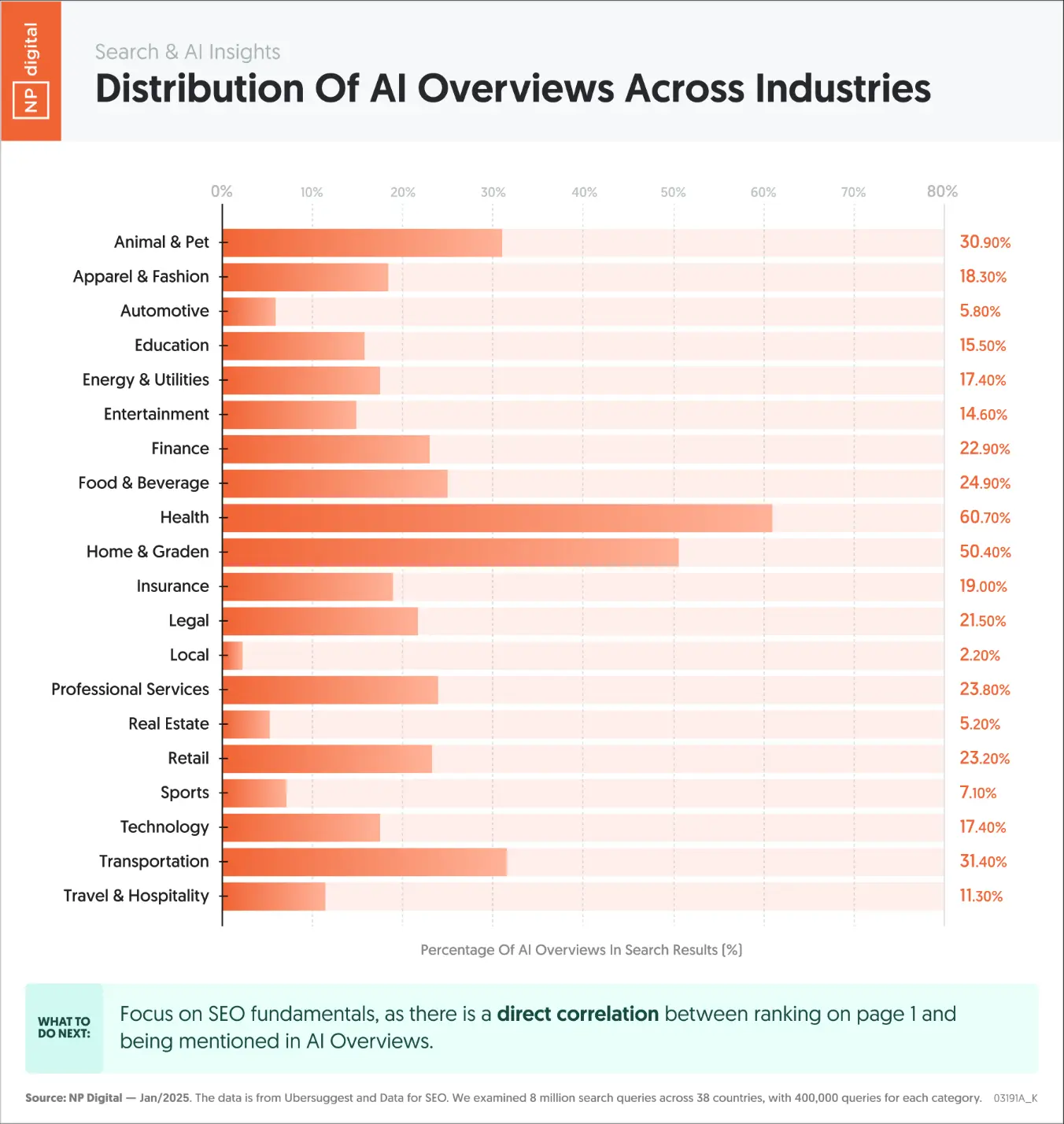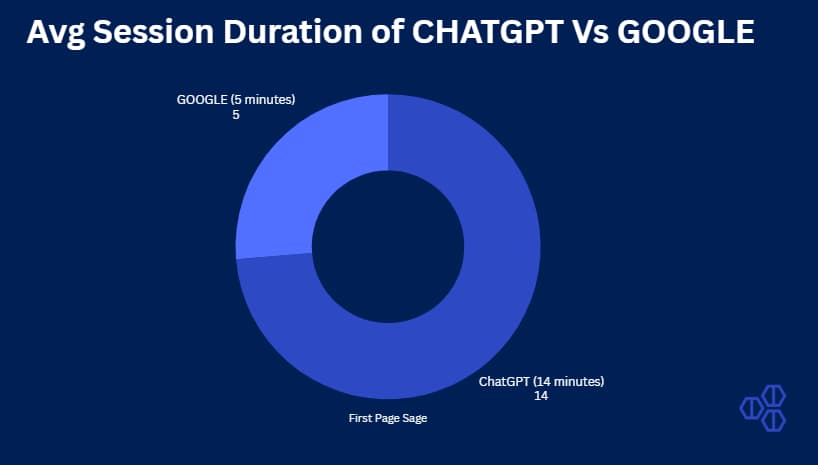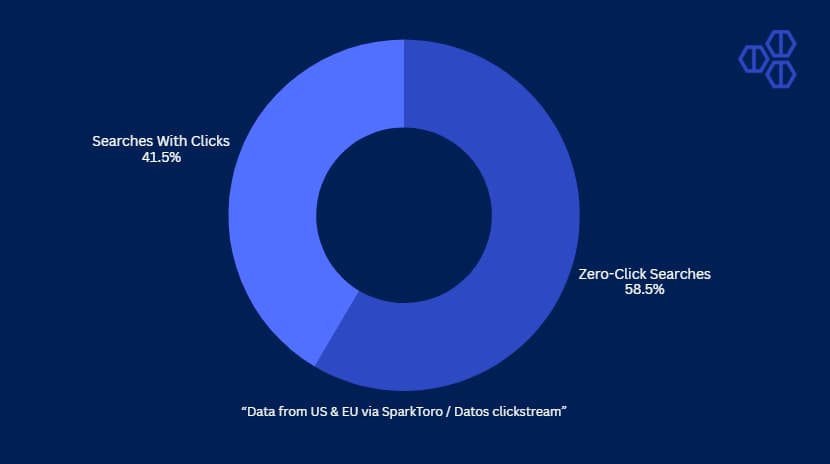Search is changing. The old days of stuffing keywords into content are over. LLM SEO has arrived, and it’s reshaping how websites get found online.
Think about it this way: when you ask ChatGPT a question, it doesn’t just match keywords like old search engines. It understands what you really want to know.
That’s the power of large language models, and Google AI Mode is using this same technology to rank websites.
Large language models like GPT-4, Google’s Gemini, and Claude are fundamentally changing how search engines interpret, process, and deliver results to users.
AI traffic jumped 527% between January and May 2025, with some websites now receiving over 1% of their total traffic from LLM-powered platforms.
This dramatic surge signals that LLM SEO isn’t just a trend—it’s the future of search optimization.
Table of Contents
- Key Takeaways
- What is LLM SEO?
- LLM SEO vs. Traditional SEO
- Best Practices for LLM SEO 2025 That Works
- 1. Focus on Semantic Relevance Over Keywords
- 2. Structure Content for LLMs
- 3. Implement Entity-Based Optimization
- 4. Create Conversational, Question-Based Content
- 5. Optimize for Featured Snippets and AI Citations
- 6. Maintain Brand Presence and Consistency
- 7. Share Original Data, Insights, and Expertise
- 8. Practice Search Everywhere Optimization
- Why is LLM SEO Important?
- Getting Started: Your LLM SEO Action Plan
- The Numbers Don’t Lie: AI is Taking Over
- How LLMs Are Changing Search Behavior
- Content Optimization Best Practices for LLM SEO
- Technical Implementation for LLM Success
- Measuring Success in the LLM Era
- Common LLM SEO Mistakes to Avoid
- Industry Impact: Real Results
- The Future of LLM SEO
- FAQs About LLM SEO
- What is LLM SEO?
- How is LLM SEO different from traditional SEO?
- How do you measure LLM SEO results?
- Can small businesses compete using LLM SEO?
- Why does LLM SEO matter now?
- Conclusions
Key Takeaways
- LLM SEO makes content optimize for AI and human readers.
- AI referrals jumped 527% in early 2025, with ChatGPT driving most visits.
- Google AI Overviews show in 10.4% of queries and cut site clicks by 34.5%.
- Write like you speak, then add clear headings and lists for AI parsing.
- Mention key entities—tools, brands, concepts—to signal topic depth.
- Link related posts to form topic clusters and prove expertise.
- Add schema markup and clean HTML so AI reads your structure.
- Track AI traffic in GA4 or Semrush by filtering ChatGPT and Perplexity referrals.
- Use engagement rate and session time, not just bounce rate, for AI visitors.
- B2B tech saw 30% traffic gains; healthcare earned AI answers for 88% of medical queries.
What is LLM SEO?
LLM SEO refers to the practice of optimizing content specifically for how large language models understand, process, and cite information.
You choose headings, lists, and data that show your points. You link to sources that prove your claims.
You craft each sentence so a model like ChatGPT, Gemini, or Perplexity can match it to a user’s question. This way, your content stands out in AI-powered replies just as it does in search results.
Unlike traditional search algorithms that primarily matched keywords and analyzed backlinks, , large language model SEO is about meaning, context, and user intent.
Here’s the difference:
Traditional search engines looked for the keyword matches you type in the search bar and then rank websites on the basis of the user search intent.
LLMs read your content like a smart human would. They understand relationships between ideas, spot helpful information, and figure out what users actually need.
When you optimize for SEO with LLMs, you’re writing for both humans and intelligent machines that can think contextually. It’s like having a conversation with your audience, not shouting keywords at them.
LLM SEO vs. Traditional SEO
LLM SEO takes traditional SEO’s groundwork and reshapes it for a world where large language models decide what gets shared.
Traditional SEO looks at search engines as the gatekeepers. You create pages, match them to people’s queries, and track your wins by climbing higher in search results, watching clicks grow, and aiming for that top spot.
LLM SEO flips the script. Here, the goal is for language models—like those behind ChatGPT or Gemini—to understand your message, trust your claims, and lift your words right into AI-powered answers.
Instead of fighting for one ranking, you focus on citations and appearances inside these smart tools, which still matters even when users don’t reach your site.
Both LLM SEO and Traditional SEO demand a solid core. Writers need content that’s thorough and well-organized.
Experts need reputations built on trust, credibility, and authority. Developers must deliver pages that load quickly and adapt to every device.
What sets LLM SEO apart is its focus on being clear and organized. Old-school strategies often depend on backlinks and tweaking for higher click rates.
LLM SEO shines when you use simple words, build clear lists or FAQs, and cite reliable sources transparently.
Where traditional SEO targeted web crawlers, LLM SEO thinks first about how a language model reads and understands.
Those who stick to classic seo risk fading away, since more users now get what they need from AI summaries—without ever clicking through.
| Category | Traditional SEO | LLM SEO |
|---|---|---|
| Focus | Focuses on ranking in Google, Bing, and other search engines for organic search positions. | Focuses on earning citations in AI responses by large language models like ChatGPT or Gemini. |
| Measurement | Measures results by keyword ranking, click-through rates, and direct website traffic. | Measures results by mentions and visibility inside AI tools, even without a click. |
| Signals Of Value | Relies on backlinks, keyword optimization, and technical factors for crawling and ranking. | Relies on clear language, structured formats like lists and FAQs, and transparent citations for language models to trust and present content. |
| Optimization | Optimizes primarily for bots and crawlers in traditional search engines. | Optimizes for how language models process, understand, and reference information. |
| Priority | Prioritizes strategies to increase site traffic visits directly. | Prioritizes being read, understood, and sourced by AI answers, meeting the shift in user behavior toward AI-powered queries |
| Core Essentials | High-quality, well-structured content; signals of expertise, authority, trust; technical site performance. | High-quality, well-structured content; signals of expertise, authority, trust; technical site performance. (Both share these foundations.) |
Best Practices for LLM SEO 2025 That Works
1. Focus on Semantic Relevance Over Keywords
LLM SEO optimization prioritizes semantic depth over keyword repetition. Instead of stuffing content with exact-match phrases, focus on covering topics comprehensively and naturally incorporating related terms and concepts.
Create content that demonstrates topical authority by addressing not just the primary query, but also related questions users might have.
This approach aligns with how LLMs process information—they reward content that shows genuine expertise and provides complete answers.
2. Structure Content for LLMs
LLMs excel at processing well-structured, hierarchical content. Use clear headings, bullet points, and numbered lists to create easily digestible information chunks.
This structured approach helps AI systems understand and extract relevant information for their responses.
Chunked formatting involves breaking content into small, standalone pieces that provide value independently.
Each section should be able to answer a specific question or address a particular aspect of your topic.
3. Implement Entity-Based Optimization
Modern SEO with LLMs focuses heavily on entities—clearly defined people, places, concepts, or things that can be uniquely identified.
Instead of optimizing solely for keywords, build content around relevant entities in your industry.
For example, if you’re writing about digital marketing, don’t just target “email marketing” as a keyword.
Instead, create comprehensive coverage around related entities like automation platforms, segmentation strategies, and customer lifecycle management.
4. Create Conversational, Question-Based Content
Structure your content around actual questions your audience asks.
Use question-based headings like “How does LLM SEO work?” or “What makes content discoverable to AI?” This format aligns perfectly with how users interact with AI search tools.
FAQ sections are particularly valuable for LLM SEO because they directly match the question-answer format that AI systems prefer when generating responses.
5. Optimize for Featured Snippets and AI Citations
75% of sources cited in AI Overviews were already ranked in the organic top 10. This means traditional SEO still matters, but getting cited in AI responses is becoming equally important.
Create content that’s easily extractable by using:
- Clear definitions
- Step-by-step processes
- Comparison tables
- Bulleted lists and key facts
- Concise explanations
- FAQ sections that address common questions
- Short paragraphs (2-3 sentences max)
6. Maintain Brand Presence and Consistency
Brands gain trust when they share knowledge often. A company that posts on its own site, writes for other outlets, and stays active on social channels signals reliability.
Each update shows steady effort. Each appearance confirms identity. This steady rhythm builds recognition. Readers see a pattern. Search engines notice the pattern too. The result is stronger credibility.
7. Share Original Data, Insights, and Expertise
Publishing Original insights sets your work apart. You share data that no one else has. You show graphs your team created.
You give examples that llm models cannot find in a quick web search. You link your study to clear insights. You help large language models spot your unique value and lift your content in their responses.
8. Practice Search Everywhere Optimization
LLMs gather answers from many corners of the web. They read forum posts, scan video scripts, and track social media.
You share your knowledge in blogs, podcasts, and Q&A sites. You post tips on your social feeds and answer questions on industry forums.
Large Language Models see your name in more places, trust your voice, and cite your content in their replies. This is Search Everywhere Optimization in action.
Why is LLM SEO Important?
Large language models serve answers first. 27% of U.S. users now turn to AI tools instead of search engines.
They bypass result pages and ask ChatGPT direct questions. This shift alters how people discover brands. Some industries surface in AI Overviews far more often than others.
If your content lacks clear structure for LLMs, AI may never surface your expertise—even if Google ranks you high. That gap hands visibility to competitors who optimize for both humans and machines.
AI also favors well-cited, authoritative content. Brands that link to reliable sources earn AI’s trust and appear in answers.
The pace of change accelerates as new AI features roll out monthly. Users adopt these tools for speed. Every month you wait costs you exposure. LLM SEO secures your spot where attention moves.
- B2B tech firms saw a 30% lift in organic traffic after LLM SEO optimization.
- Healthcare sites earned AI Overviews for 88% of medical queries, boosting visibility by 45%.
- E-commerce stores capture 20% of referrals from ChatGPT and Perplexity, up from 5% last year.
- Financial services pages saw a 37% increase in qualified leads from AI-driven search results.
- News and media brands reduced bounce rates by 22% on AI-referred visits, thanks to clear, structured content.

Getting Started: Your LLM SEO Action Plan
Week 1: Audit Your Current Content
- Review your top-performing pages
- Identify opportunities for better structure and clarity
- Check if your content answers complete questions, not just keywords
Week 2: Implement Technical Foundations
- Add schema markup to key pages
- Ensure AI crawlers can access your content
- Clean up site architecture and navigation
Week 3: Create AI-Friendly Content
- Write one piece of comprehensive content on your main topic
- Use natural language and clear structure
- Include FAQ sections and definition boxes
Week 4: Monitor and Measure
- Set up tracking for AI platform referrals
- Monitor brand mentions in AI responses
- Track engagement metrics for AI traffic
The Numbers Don’t Lie: AI is Taking Over
The shift is already happening. ChatGPT now dominates 77.97% of all AI referral traffic globally. Google’s market share dropped below 90% for the first time since 2010, as AI platforms gain ground.
ChatGPT leads search behavior change with 542 million monthly active users spending an average of 14 minutes per session. Compare that to Google’s 5-minute sessions, and you see how deeply users engage with AI.
Source: FirstPageSage

Even more striking: AI Overviews reduce top search result clicks from 28% to 19%.
Position #2 dropped 39% in click-through rates. Users are getting answers directly from AI, not clicking through to websites.
But here’s the opportunity: websites that get cited in AI responses see higher engagement.
When AI platforms do send traffic, those visitors stay longer and engage more deeply than traditional search traffic.
How LLMs Are Changing Search Behavior
The transformation goes beyond technology—it’s reshaping how users interact with search engines entirely.
From Keywords to Conversations
Users are increasingly asking complete questions rather than typing fragmented keywords.
Instead of searching for “SEO tips,” they’re asking “What’s the best way to optimize my website for AI-driven search?”
LLM SEO optimization means answering these natural language questions clearly and completely.
Understanding User Intent
When someone searches for “apple,” old algorithms struggled to know if they meant the fruit or the company. LLMs use context clues to figure out what users really want. Your content needs to provide that context.
Semantic Relationships
Large language model SEO rewards content that covers topics thoroughly. If you write about email marketing, also mention automation, segmentation, analytics, and deliverability.
LLMs recognize these connections and reward comprehensive coverage.
The Rise of Zero-Click Searches
Close to 65% of Google searches in 2023 resulted in zero clicks, a figure that has only increased with the rollout of AI Overviews.

Users are finding their answers directly in AI-generated summaries, fundamentally changing how businesses must approach content strategy.
Multi-Platform Discovery
Search is no longer confined to traditional engines. ChatGPT leads AI referral traffic across industries, while Perplexity accounts for nearly 20% of AI traffic to health and ecommerce websites.
This diversification requires a multi-platform approach to large language model SEO.
Content Optimization Best Practices for LLM SEO
Successful SEO with LLMs requires a balanced approach that combines AI insights with human oversight:
Write for Humans First
While optimizing for AI is important, never forget that your ultimate audience is human. Create content that provides genuine value and maintains an authentic voice.
Maintain Editorial Standards
Use AI tools to scale insights and improve efficiency, but maintain human oversight to ensure accuracy, originality, and emotional resonance.
Focus on Expertise
Demonstrate genuine expertise through original research, detailed analysis, and unique perspectives that set your content apart from AI-generated alternatives.
Maintain Content Freshness
According to Search Engine Journal: AI systems favor recently updated content.
Pages with updates in the last 90 days see a 17% lift in AI referral traffic compared to static pages. Schedule quarterly reviews to refresh statistics, date-sensitive examples, and links.
Include Concise Definition Boxes
AI Overviews often pull short, precise definitions. Content that offers 20–40-word definition summaries under clear subheadings is cited 42% more often in generative answers.
Use Question-Based Headings
Data shows that 65% of AI-driven search queries take the form of natural questions. Framing section titles as “How does X work?” or “What is Y?” increases the odds that your content matches user intent and surfaces in AI Overviews.
Technical Implementation for LLM Success

Structured Data and Schema Markup
Implement comprehensive schema markup to help AI systems understand your content’s context and relationships.
Use relevant schema types like Article, FAQ, HowTo, and Organization to provide clear signals about your content’s purpose and structure.
Clean HTML and Accessibility
Ensure your site’s HTML is clean and accessible to AI crawlers. Remove render-blocking issues, maintain accurate sitemaps with timestamps, and create clear URL structures that make content easily discoverable.
Internal Linking Strategy
Develop contextual internal linking that helps establish topic relationships and demonstrates expertise across related subjects.
This helps AI systems understand the connections between different pieces of content on your site.
Canonical Tag Implementation
Set canonical URLs to prevent duplicate content issues. Point similar pages to the primary version. This helps AI understand your preferred content version.
Measuring Success in the LLM Era
Traditional metrics like keyword rankings and organic click-through rates are becoming less relevant as large language model SEO changes the landscape.
New KPIs for LLM SEO
Focus on metrics that reflect AI visibility:
- Brand mentions in AI responses
- Citations in AI Overviews
- Referral traffic from AI platforms
- Featured snippet appearances
- Source of Original mentions
Attribution Challenges
The rise of AI interfaces creates significant attribution challenges. Users receive information from AI systems without ever visiting your site directly.
Monitor branded searches and proxy metrics to understand your true impact in the AI-driven ecosystem.
Brand Mentions in AI Responses
Track how often your brand or content gets cited in AI-generated answers. Tools like Brand24 or Mention can help monitor this.
AI Platform Traffic
Monitor referrals from ChatGPT, Perplexity, Claude, and other AI platforms. This traffic often has higher engagement rates.
As such there is no tools to measure AI traffic from LLMs.
Many platforms track AI-driven visits. Google Analytics 4 shows referral sources from ChatGPT and Perplexity. Ahrefs monitors brand mentions in AI responses.
Semrush builds custom segments with regex filters to isolate LLM traffic. SE Ranking offers dashboards that display AI visibility metrics. Writesonic tracks user behavior from AI platforms.
Looker Studio creates visual reports for AI referral data. These platforms use different approaches—some analyze source codes, others set up filtered views. Pick the method that fits your reporting needs and budget.
Featured Snippet Performance
75% of AI Overview sources already ranked in the top 10. Focus on earning featured snippets as they often become AI training data.
Engagement Metrics
Here’s what you should know based on the latest research and how the industry tracks LLM SEO visibility:
- Analytics platforms like GA4, Ahrefs, Semrush, SE Ranking, Writesonic, and Looker Studio track visitors from AI sources.
- These tools filter traffic by referral source—ChatGPT, Perplexity, Claude—and create custom reports for AI behavior.
- You can measure session counts, time spent on site, and event tracking for AI-driven visits.
- Engagement rate and average session time work better than bounce rate for AI traffic analysis.
- Bounce rate still tracks, but AI visitors often grab quick answers and leave—high bounce doesn’t mean poor content.
- GA4’s engagement metrics give clearer insights than traditional bounce measurements for LLM referrals.
Key point:
You can track session data, engagement rates, and (with context) bounce rates for AI traffic using these platforms, but interpret the results carefully because LLM-driven users behave differently than organic users. Monitoring engaged sessions, specific events, and conversion rates for this segment will give you better insight than bounce rate alone.
Common LLM SEO Mistakes to Avoid
Despite its benefits, LLM SEO optimization comes with significant challenges:
Content Saturation
As more businesses embrace AI-generated content, differentiation becomes crucial. Simply relying on LLMs won’t guarantee visibility in an increasingly crowded landscape.
Accuracy and Hallucinations
AI systems can sometimes generate convincing but factually incorrect information. Maintaining accuracy and credibility becomes more important than ever.
Resource Requirements
Optimizing for LLMs requires ongoing investment in tools, structured data implementation, and content updates. Small businesses may face resource constraints in keeping up with these demands.
Over-Optimizing for AI
Don’t forget humans. While llm seo optimization matters, your primary audience is still people. Write for humans first, then optimize for AI.
Keyword Stuffing 2.0
Some marketers stuff content with “semantic keywords” instead of primary keywords. This doesn’t work. LLMs detect unnatural language patterns.
Ignoring E-A-T
Expertise, Authoritativeness, and Trustworthiness remain crucial. AI systems amplify these signals. Build genuine authority in your field.
Copying Competitors
LLMs reward unique perspectives and original insights. Don’t just rewrite what others have said – add your own expertise and examples.
Industry Impact: Real Results
Companies implementing llm seo strategies are seeing impressive results. Some report 30% boosts in organic traffic after optimizing content for AI consumption.
B2B tech companies saw AI Overview coverage grow from 36% to 70% in the past year. Healthcare and education queries now show AI Overviews nearly 90% of the time.
The pattern is clear: industries that adapt early to SEO with LLMs gain significant competitive advantages.
The Future of LLM SEO
Looking ahead, large language model SEO will only become more important. ChatGPT traffic grew 8x from October 2023 to April 2025, and this trend shows no signs of slowing.
New AI platforms emerge regularly, each with unique optimization requirements. The key is building content that performs well across multiple AI systems, not just optimizing for one.
Voice search, visual search, and multimodal AI will create new optimization opportunities. Companies that master llm seo fundamentals now will adapt more easily to these changes.
Stay ahead by:
- Continuously monitoring AI platform developments
- Testing new optimization strategies
- Investing in structured data implementation
- Building authoritative entity relationships
- Creating high-quality, original content that showcases expertise
FAQs About LLM SEO
What is LLM SEO?
How is LLM SEO different from traditional SEO?
How do you measure LLM SEO results?
Can small businesses compete using LLM SEO?
Why does LLM SEO matter now?
Conclusions
LLM SEO represents more than just an algorithmic update—it’s a fundamental shift toward intelligent, context-aware search optimization.
The statistics are clear: AI-powered search is growing rapidly, ChatGPT weekly active users grew 8x from October 2023 to April 2025, reaching over 800 million users.
Meanwhile, Perplexity received 173.58 million visits in July 2025 alone, with an impressive average session duration of nearly 13 minutes.
Success in this new AI/LLM SEO requires abandoning outdated keyword-stuffing tactics in favor of semantic relevance, structured content, and genuine expertise.
Businesses that embrace large language model SEO strategies now will gain significant competitive advantages as AI continues reshaping how users discover and consume information.
The future belongs to content creators who understand that optimization is no longer about gaming algorithms.
It’s about creating genuinely valuable, well-structured content that both humans and AI systems can understand and appreciate.
By focusing on clarity, authority, and semantic depth, your content can thrive in the age of artificial intelligence.
Thank you for reading this post, if you have any problem leave you problems in the comment section. And don't forget to subscribe!


Really enjoyed this post! The way you explained LLM SEO vs traditional SEO made things so clear. I especially liked the tips on structuring content for AI with FAQs and snippets—super practical.
This is a thorough exploration of LLM SEO—exactly the kind of guidance many content creators and marketers need. I especially appreciate how you’ve moved beyond the usual “keyword tips” and delved into semantic relevance, entities, and AI citations. The emphasis on structured, human-friendly content that LLMs can parse is smart. One thing I’d love to see more of is examples of small brands doing this well—how they’ve measured AI-driven traffic gains or how they’ve adjusted existing content (not just new content) to perform better in AI responses. Overall, great read; this reinforces how staying ahead with AI understanding isn’t optional anymore—it’s essential.